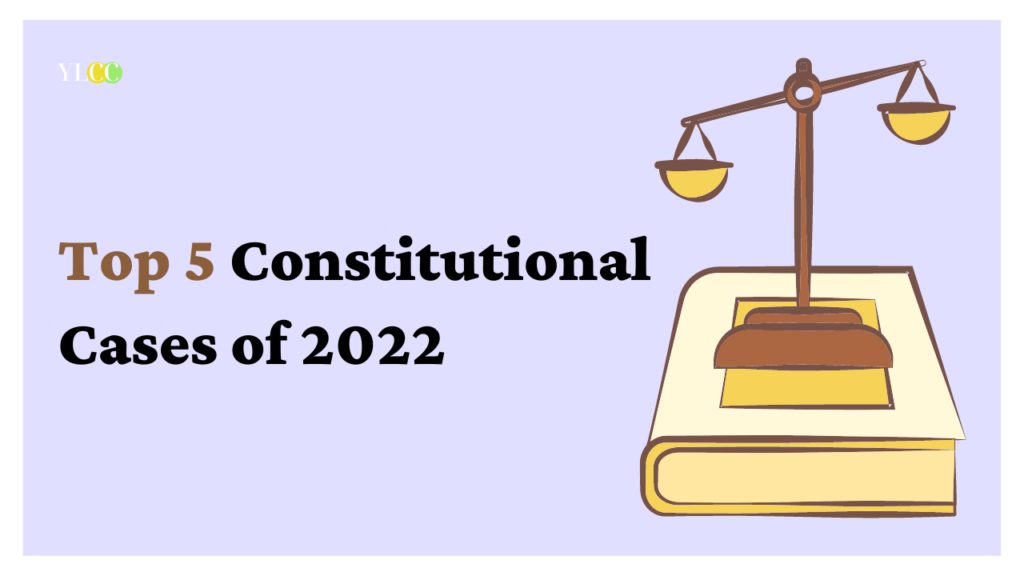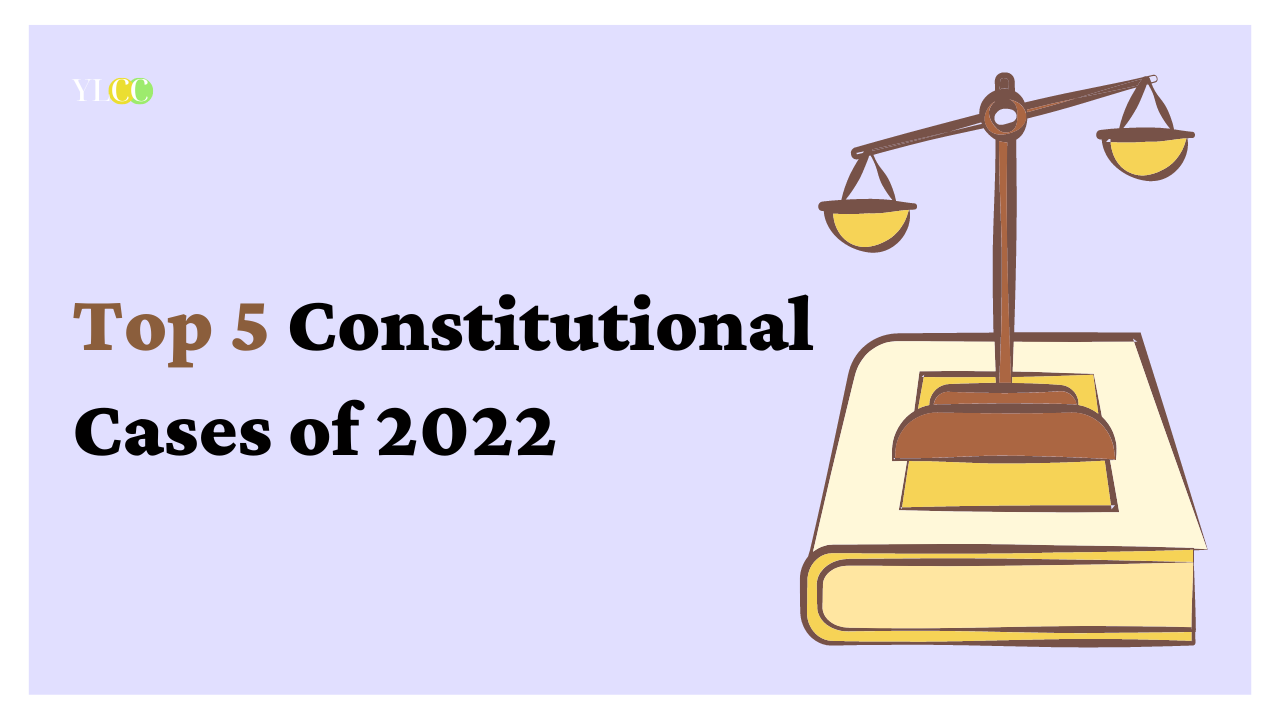
The Indian Constitution says that all Indian citizens have the same rights, no matter where they come from, what they believe, what gender they are, etc. The Indian legislature is in charge of making laws and policies that are in line with the Constitution. The job of the judicial system is to make sure that the law is followed, to settle legal disputes, and to protect the rights of the people. There are some situations that, when resolved, lead to important decisions that help a country move forward.
The Supreme Court, which is the highest court in the country, is in charge of interpreting these laws and protecting the Constitution. The highest court is in charge of making sure that everyone’s basic rights and freedoms are respected and protected. Article 141 of the Constitution also says that “law proclaimed by the Supreme Court will be binding on all courts within the territory of India.” This means that the Supreme Court sets examples for how the law should be interpreted in similar situations in the future.
In 2022, the Supreme Court made a number of decisions that will be remembered for a long time. These decisions will affect different groups of people in different ways. Here is a short list of some of the most noteworthy ones.
Recognizing Sexual Work as a Legitimate Line of Profession
Case Name: Budhadev Karmaskar vs. State of West Bengal
Couram: Justice L. Nageswara Rao, Justice B.R. Gavai and Justice A.S. Bopanna
Claim: The deceased woman, who worked as a prostitute, was subjected to a vicious sexual assault at the hands of the accused, Budhadev Karmaskar. The accused person was found guilty by the High Court of Calcutta, and the court handed down a sentence of life in jail. In response to the ruling handed down by the High Court, an appeal was submitted to the Supreme Court. The said appeal was rejected and, in the same judgement, the bench suo moto changed it into PIL and suggested that the Central and State governments think about initiatives for the upliftment of sex workers.
Question: Whether sex work is a legitimate profession?
Constitutional Provisions: Article 21 and 142 of the Constitution of India
Judgment:
“Notwithstanding the profession, every individual in this country has a right to a dignified life under Article 21”
- In this particular case, the Supreme Court acknowledged that sex work is a “profession” and ruled that consenting practitioners of sex work are entitled to dignity and equal protection under the law. This decision was made in light of the aforementioned case. A few directions for the rehabilitation measures in respect of sex workers were issued by the court using its inherent powers under Article 142 of the Constitution. For example, if there is any raid on any brothel, the sex workers concerned should not be arrested or penalized or harassed or victimized in any way. The court also directed UIDAI to issue Adhar Cards to the Sex Workers based on a proforma certificate.
- All people who work in the sex industry should be treated with respect by the police, who should never verbally or physically abuse them, force them to engage in sexual activity against their will, or subject them to any kind of violence.
- During arrest, raid, and rescue operations, the identity of sex workers should not be publicized or broadcasted. The Press Council of India should create adequate rules to ensure that this does not happen.
- It is essential that the precautions taken by sex workers for their own health and safety (such as the use of condoms and other similar practices, for example) not be interpreted as criminal acts or considered proof of the performance of a criminal act.
- The governments of both countries are required to provide seminars to teach sex workers on the rights that they are entitled to.
Reservation For Economically Weaker Section
Case Name: Janhit Abhiyan vs. Union of India
Couram: Justices Dinesh Maheshwari, Bela Trivedi, JB Pardiwala, S Ravindra Bhat, and Chief Justice UU Lalit.
Claim: The validity of the Constitution (103rd) Amendment Act 2019 was challenged in the Supreme Court.
Question: Whether the Constitution (103rd) Amendment Act 2019, providing for reservations for economically weaker sections (EWS) in jobs and education, is constitutional.
Constitutional Provisions: The Constitution (103rd) Amendment Act 2019 inserted clauses (6) in Articles 15 and 16 of the Constitution to provide for economic reservation.
Judgment:
The Supreme Court upheld the 103rd Amendment and ruled that EWS among upper castes can be promoted through various affirmative actions at the threshold level, such as scholarships, instead of quotas in government jobs and educational institutions. The court acknowledged that poverty is not a permanent condition and that the term “reservation” has different connotations, including social and financial empowerment, and is aimed at addressing the centuries-long oppression of certain classes and promoting their advancement.
Reservation in Promotion Case
Case Name: Jarnail Singh vs. Lachhmi Narain Gupta
Coram: 3 Judge Bench of HM Justices L. Nageswara Rao, Sanjiv Khanna and B.R. Gavai
Authored by: HM Justice L. Nageswara Rao
Claim: The issue before the court was the applicability of “reservation in the matters of promotion” introduced through the 77th Constitutional Amendment Act, 1995. The court discussed the issues under Articles 16(4-A) and 16(4-B) of the Constitution.
Question: The court considered the following broad questions in its judgment:
- The yardstick for arriving at quantifiable data proving the inadequacy of representation of SCs and STs for reservation in promotion.
- The unit for collecting quantifiable data for determining the inadequacy of representation of SCs and STs.
- The proportion of SCs and STs in the overall population to be considered for the purpose of applicability of reservation in promotion.
- The fixed time period for reviewing the inadequacy of representation of SCs and STs.
- The prospective applicability of the judgment of M. Nagaraj v. Union of India and the power of the court to make such a declaration.
Constitutional Provisions: The court considered the provisions of Articles 16(4-A) and 16(4-B) of the Constitution of India.
Judgment:
The court held that the data collected for determining the inadequacy of representation must be objective, broad-based, and reflective of appropriate yardsticks. The unit for collecting quantifiable data should be the cadre strength, i.e. the total number of posts available in the grade to which promotion is sought. The court discussed the concept of promotion and the four-point test for examining whether the post is a promotional post or not.
The court held that proportionate representation or adequate representation must be referred to as representation in the services in the particular cadre, not the overall population. The court declared that 10 years is a reasonable period for periodic review of the necessity and extent of reservation. The court declared that the judgment of M. Nagaraj v. Union of India was of prospective effect and disposed off the pending SLPs in view of the findings from various states.
No One Can Be Compelled To Take The COVID Vaccine
Case Name: Jacob Puliyel vs. Union of India
Coram: Justices L Nageswara Rao and BR Gavai
Claim: The Petitioner claimed that the mandates of vaccines in the absence of informed consent were unconstitutional.
Question: Whether the coercive vaccination policy of the Union of India interferes with the principle of informed self-determination of individuals protected by Article 21 of the Constitution of India?
Constitutional Provisions: Article 21 of the Constitution of India protects the right to life and personal liberty.
Judgment:
The court found the vaccination policy of the Union of India not to be unreasonable and arbitrary, but held that bodily integrity is protected under Article 21 of the Constitution of India and no individual can be forced to be vaccinated. The court held that personal autonomy of an individual involves the right to refuse medical treatment in the sphere of individual health. However, the court held that the government can regulate public health concerns by imposing limitations on individual rights that are reasonable and proportionate to the object sought to be fulfilled. The court found the restrictions on unvaccinated individuals to be not proportionate and directed the authorities to review the relevant orders and instructions imposing restrictions on unvaccinated individuals.
The Question of ‘State’
Case Name: Kishor Madhukar Pinglikar vs. Automotive Research Assn. of India
Bench: 2 Judge Bench of HM Justices Sanjiv Khanna and Bela M. Trivedi
Author: HM Justice Sanjiv Khanna
Question: Whether the respondent Automotive Research Association of India is a State within the meaning of Article 12 of the Constitution of India and covered under Part III rights.
Constitutional Provisions: Article 12 of the Constitution of India
Judgment:
The central question in this case was whether the respondent, the Automotive Research Association of India, was considered a “State” within the definition of Article 12 of the Constitution of India and therefore covered by the provisions of Part III rights. The court applied various tests and precedents, including the Constitution Bench judgment in Pradeep Kumar Biswas v. Indian Institute of Chemical Biology, to determine whether a body fell under the purview of Article 12.
The court found that the government had no role in the establishment, operation, or constitution of the automotive association, and that most members of the association were private players with no ties to the government. The court also noted that the government only had a nominal involvement in the management of the association through the nomination of three members to its 30-member council. The employees of the association were governed by the memorandum of articles of association without any guidelines or prescriptions from the government. The decision-making process of the association did not involve the government either.
As a result, the court concluded that the association was not dominated by government control, but rather enjoyed a significant degree of freedom and autonomy. Based on these findings, the court upheld the decision of the Bombay High Court that the Automotive Research Association of India was not an agency or instrumentality of the government and was therefore not covered by Article 12 of the Constitution of India.
Conclusion
The role of the Indian judiciary has been crucial in defining and shaping the legal system of the country, particularly in matters related to constitutional rights and social justice. The cases that have been adjudicated by the judiciary illustrate its proactive involvement in shaping social policies and advancing inclusivity and equality in the society.
YLCC would like to thank Pearl Narang for her valuable insights to this article.






